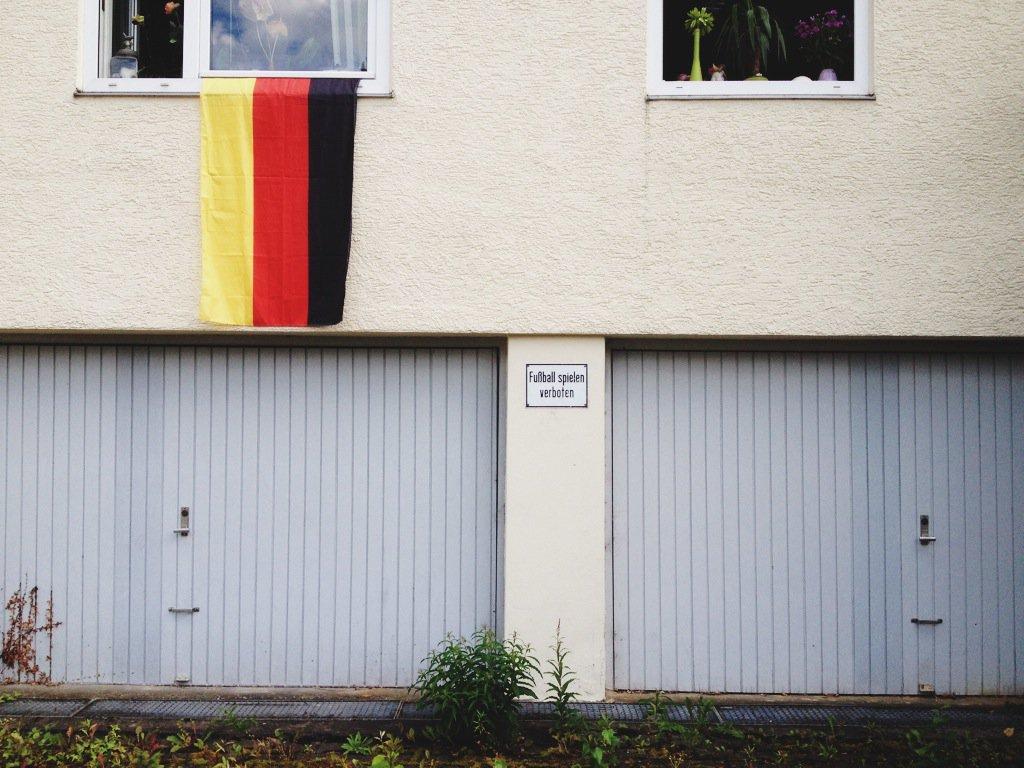
By Daniel Roßbach
At least in Germany, there are rarely as many displays of patriotism in public space as during big football tournaments. People mount flags on balconies and cars, masses gather to watch 'their' team play and win, and many in the media seem to share their preference, speaking and acting as part of a 'we'.
Perhaps there are reasons to act that way regarding one's national team. Just the circumstance of a shared nationality doesn't give rise to any.
Let's get clear about what we mean here by 'shared nationality'. I am using that term in a rather all-encompassing manner that includes formal citizenship as well as connections of culture or heritage and unilateral or reciprocal adaption of a country as one's own. That usage fits the discussion as it is about the link between belonging to a country to adopting a positive, supporting stance towards it's national team (in sports, although much of what is said here may also apply to other fields).
Moreover, it should be apparent that, in case my arguments here are successful, they don't show that it is not permissible for anyone to support their country's national team. For one part, that is because obviously every good reason in favour of supporting any team may also be applicable to the one that happens to be one's own. And it would also at least require more thought and argument to show that all of one's actions need to be covered by reasons to be (morally) permissible. And, of course many acts motivated by the kind of feeling I want to show as unfounded by good reasons may be entirely agreeable
But, what should even motivate us to question attitudes that seem to be shared pretty much universally? Especially in the German case it feels somewhat odd having to explicate why caution may be advised in dealing with patriotic emotions. But Germany doesn't stand alone in this regard - the atrocities in its past are merely more prominent than others'.
Yet to look at a country's past in this way is not even necessary when looking into current political realities in the US, Austria, France, England or Germany makes the danger in excessive nationalism all to apparent. Sure enough not every instance of referring to nationality to ground some commitment falls into the pitfalls of extreme nationalism. But that these perils loom gives reason to distrust at least toward unreconstructed national (self) identification.
As Lukas is showing below, to become a fan of a national team because it is that of one's nation is neither sufficient nor necessary to generate the most problematic expressions of nationalism. But it does normalise excluding mechanisms: even people who are not nationalist arseholes emphasise in such moments their nationality in building their self identity. Of course it is possible to be a fan of one's national team without exhibiting any of the wrong forms of nationalism, which goes to show that it is not the only ingredient in an unsavoury nationalist mixture.
But it doesn't follow that it isn't one active ingredients in it. Equally, we can not conclude that in all instances of problematic nationalism there are other contributing factors that qualify as the decisive ones on those terms. Think of a xenophobe inclination whose presence may be an unfortunate but difficult to change psychological fact for some people, which would not find a venue outside of international football. Given that, patriotic football fandom contributing to excessive nationalism at all means there would be less of a moral bad without it, and there may not be a more effective way of avoiding its occurrence. Especially from a consequentialist perspective that should move us to reverse the burden of argument, moving us to only put national identities at the centre of out selves with regards to an issue if the subject matter demands us to do so.

The lack of reflection on show on fan miles and elsewhere around professional football generates unease about the way in which autochton identities get fortified there, potentially preparing the ground for more dangerous versions of nationalism. The thoughts I present here are intended to induce some of the reflection on the topic I am calling for.
Turning to the phenomenon of nationally motivated football support, we find that not to be the case. Patriotic loyalty is nothing to do with the game itself, football in our case. People interested in the game (which by no means must or should be everyone) ought to focus on what is done on the pitch, and the judgements one comes to in watching the game should inform and ground one's emotional investment.
There may be at least two objections to this claim. First, as we are talking about international football, it seems obvious that nationality is a central organisational principle of the undertaking. So why should a principle that applies to players not also appeal to supporters? Our answer to this objection is multifaceted. Part of it is that - despite resurging nationalisms - we live in an increasingly cosmopolitan world, in which a (for example Swiss or Albanian) international's allegiance is sometimes more fluid than their position on the pitch.
But we could take the objection to show that the nationality-focused selection mechanism is not substantially founded. In fact, there is no intrinsic necessity to organise the teams competing in summer competitions by nationality - but there may not be a viable alternative that would possess the attributes that make them interesting on sporting terms. They consist in defining a relatively immutable set of players for each team that poses the task of forming a functioning team out of it, in which the lack of a world class left back can not be compensated by money.
There is no intrinsic necessity to organise the teams competing in summer competitions by nationality
Of course there would be some other grouping mechanisms - like by what day of the month a player was born, if a way can be found to make up a 32nd team. What would be missing there are institutions that can compete in producing talent. Stories like 'das Reboot' are fundamental to the intrigue of those competitions.
The second objection is that my argument may prove too much, as my argument may also apply to following football clubs, and thus run into a progression ad absurdum That objection can be dealt with by on the one hand pointing out that club loyalty does not have the same problematic connotations as nationalism, at least not for the same reasons. On the other hand, we can follow along with the objection in conceding that both club loyalty may be misplaced if it does run analogously, and there may be a genuine connection between some people and their national teams that would give as legitimate reason to follow their national teams as others have to support their club.
That the choice of which team to support should follow substantial footballing reasons does not mean that everyone should just support the best team. Rather, a fan should choose the team that best fits their character and taste. In the last World Cup, Germany may have been the best team, yet I preferred Chile's tactically aggressive, proactive and quick-passing Bielsa/Sampaoli style to Löw's balanced approach.
That point gives us reason for a brief aside on the contingency of nationality. Critical approaches to national feelings often point out the randomness of belonging to any particular nation, and argue that it is absurd to load it with any more significance. That argument fails because nationality and cultural socialisation influenced by it are real features of a politically situated person, generating sensibilities and responsibilities. It does make a difference to me whether fascism seems to gather force in Germany or Austria.

If one's own country's team is playing the right kind of football (more on what that means on an other occasion), that can be especially satisfying. Yet the reasons making this the case do not give us reason to feel supportive of a team in less fortunate constellations (like in between 90ies and nought-ies Geman football, which no one should have supported).
Exactly because national identification is not merely coincidental, but has some substantial base, means it is not entirely a matter of choice. I can't decide to be Chilean in the same way in which I can decide to support the Chilean team (whether or not that national identity is unproblematic is beside the point).
That also means that when, as at these Euros, other followers of one's national team commit violent crimes or conduct themselves as nationalist arseholes, one loses ground on which to distance oneself from them when constructing one's footballing identity around an immutable fact, leaving oneself associated with unwanted consorts in collectives or plural subjects.
Against the thought that this is problematic someone may object that the association with these elements of actual importance are the ones in political institutions that can sanction and prevent these acts, as well as that no matter football sympathies one can always clearly draw a line between oneself and the disgusting acts of others with whom there is no connection that is immediately relevant to their transgressions. Neither point is wrong, but they don't alter the fact that by identifying patriotically one is seated in a (morally sinking) boat with no easy escape.
This dynamic becomes more relevant with regard to dynamics that grab hold not only of nationalist arseholes. They are for example ill-conceived discourses in which a longing for leadership figures or doubts about Mesut Özil's talent are expressed, as well as the perpetuation of arrogant feelings of entitlement . They are part of a collective spirit that is hard to escape when supporting one's national team (as such) and that only exists because most people do so.
Similarly annoying as such attitudes, and equally dependent on closed national identification are the perhaps most hideous consequences of international football 'being a thing': nationally themed merchandise. In all honesty, these products make my point more effectively than any argument could.

Belonging to some nation does not give anybody reason to support ones national team, and nobody should do so for that reason -- that is the claim to be disputed here, in somewhat contentious and cursory fashion. Why should that be the case? Let's evaluate some possible arguments.
It could be claimed that it is inherently - in and out itself, irrespective of consequences - wrong to be a patriotically guided football fan. There are some kinds of actions of which many people think that they are wrong in this way, with lying being one prime example. Even a lie that goes without negative consequences, e.g. because the person being lied to never knows and suffers no harm from it, continues to be problematic, according to that view. May this be the case for choosing one's footballing allegiances in a patriotic way. I can't see why that would be the case. If anything is wrong about it, it must be to do with the consequences that decision may bring about, and not its intrinsic character. (I have a hard time imagining what it means for an action to be inherently wrong in any case, but the reader may feel differently about that.)

Alright then, consequences are where all the action is at. If one should not become a fan of one's own national team, it is because that would entail negative consequences. Before we can move on to think about what those consequences could be, we need to introduce a couple of distinctions. In my understanding, the claim we are debating is that there is something especially problematic about supporting one's own national team. What is 'especially problematic' supposed to mean here? It means 'more problematic than supporting any other team would be.' We aren't talking about what may be questionable about being partial in football matches at all, but only the more narrow case of favouring one's national team. Negative consequences that arise from football fandom in general aren't of interest here, and can safely be ignored.
That is not all, though. We can also disregard all perils in supporting one's national team that are not dependent on doing so because the team is of the nation one belongs to, but for example because it was the lot drawn in a raffle.
With those clarifications out of the way, we can get to the issue itself. But keeping them in mind, are there any negative consequences of patriotic eligible to be discussed? Well, my opponent may claim, there are a number of phenomena that are a) in some way bad; b) only come up in supporting one's national team; and c) be doing so because it is one's national team. What could those consequences be? It's a diverse set of circumstances that vary widely in what exactly happens in them and how grave any wrongs it entails are, but could be summed up as: behaving like a nationalist arsehole. I wouldn't want to deny that these would be bad consequences.
A comparably mild expression of that stance could be to insultingly ridicule opponents or other countries. In more serious cases it may result in xenophobic violence etc. I am prepared to admit to my opponent that there may be a statistical correlation between 'being a fan of one's national team for reason of it being the team of one's nation' and nationalistic behaviour. Probably, members of that group tend to be more likely, statistically, to behave as nationalistic arseholes. I don't intend to deny that such behaviour would be a negative consequence as in question.
So, am I conceding the debate to my protractor? Am I flying the white Germany shirt to signal defeat? No, I am not going that far. We have to look a little closer at the kind of link I just admitted exists. Let's start here: Is being a nationally inclined fan a necessary condition for being a nationalistic arsehole? Clearly not. There are many paths that lead one to be a nationalistic arsehole, this is but one of them. But could being that kind of fan be a sufficient condition for being that kind of arsehole? I strongly doubt that too. I am a fan of the German national team and I cannot deny the fact that me being German has a lot to do with that. But I would like to state with clear conciousness that I am not acting like a nationalistic arsehole. I do not insult other nations, don't put them down with other behaviour, don't subscribe to the slogan "right or wrong, my country" and, to the best of my knowledge, am not xenophobic. What's more, I am reasonably sure that I am not alone in this. Many people manage to be fans of their national team, and not become nationalistic arseholes.
Have I proved all I needed to? Is it enough to state that being one's national team's fan for that link's sake is neither sufficient nor necessary for being a nationalistic arsehole? No, that again would be to quick on my part. For it could be that this affiliation is increasing the risk of turning into a nationalistic arsehole. And I do have to concede that it seems reasonably likely that such an assumption could turn out to be true. Isn't that enough to demonstrate it's problematic to align one's preferences this way? To make the last point in this essay, that this is not so. The risk of becoming a nationalistic arsehole don't increase as in a lottery when footballing preferences and citizenship are run in parallel. It's not like there being one nationalist arsehole among a hundred members of the general public, and one in ten among national team fans. Unlike in such a lottery anybody has an active role to play in becoming such an arsehole, quite apart from football fandom. One is obliged to exercise that role. People are called upon morally to keep themselves from falling into being nationalistic arseholes, as and because that statistical link exists: especially, when one follows one's own team because it belongs to one's nation. If one discharges that duty, I can not see what would stand against supporting the national team of one's country in that function. It just needs to be done responsibly.